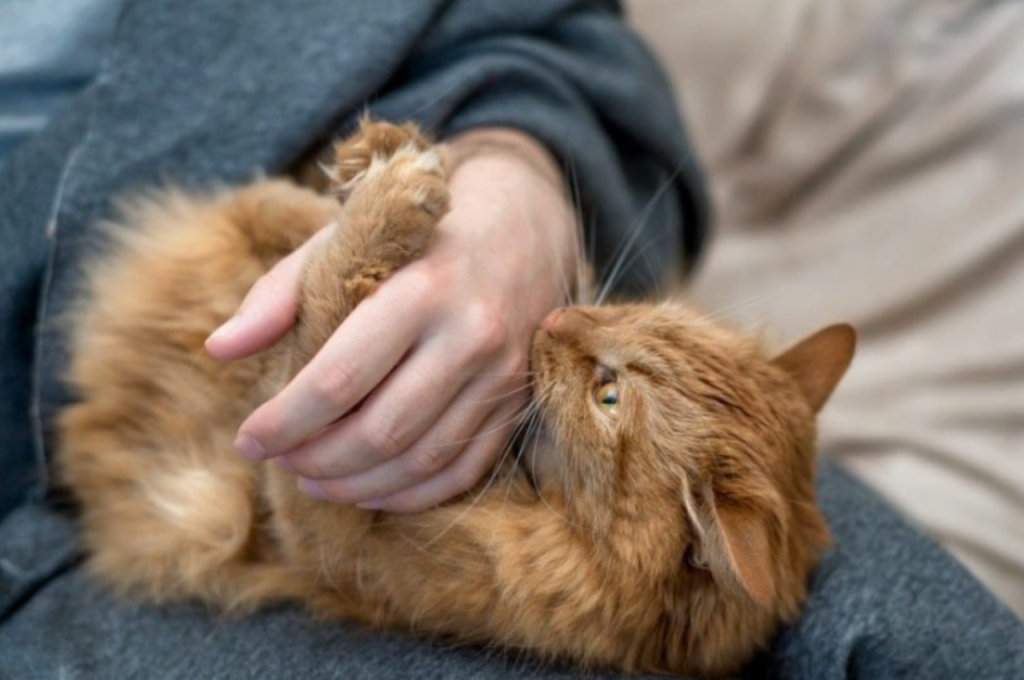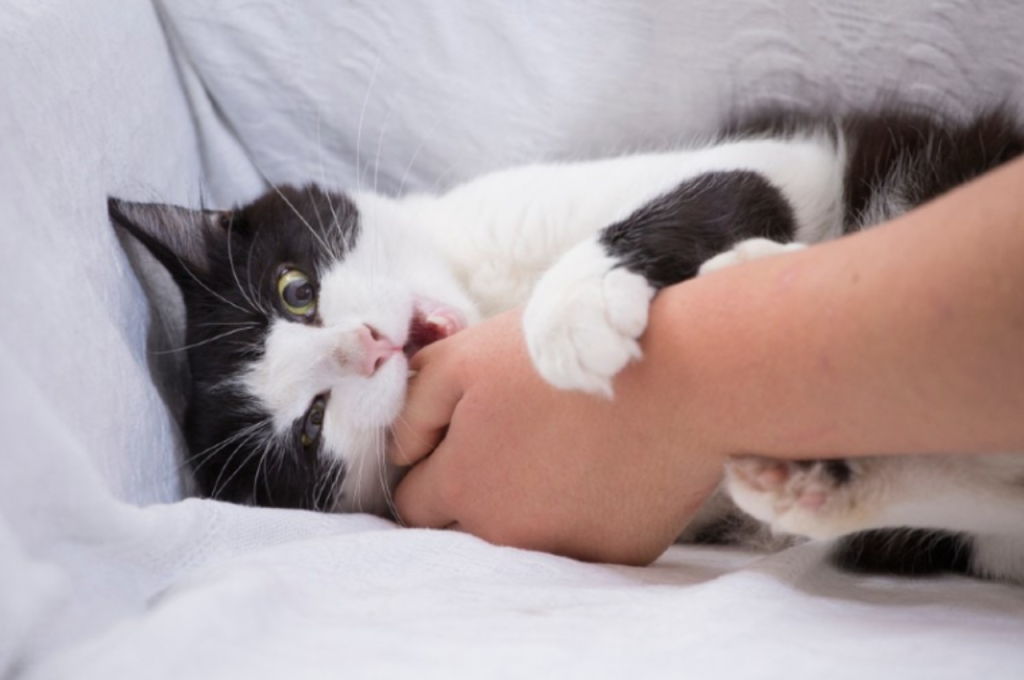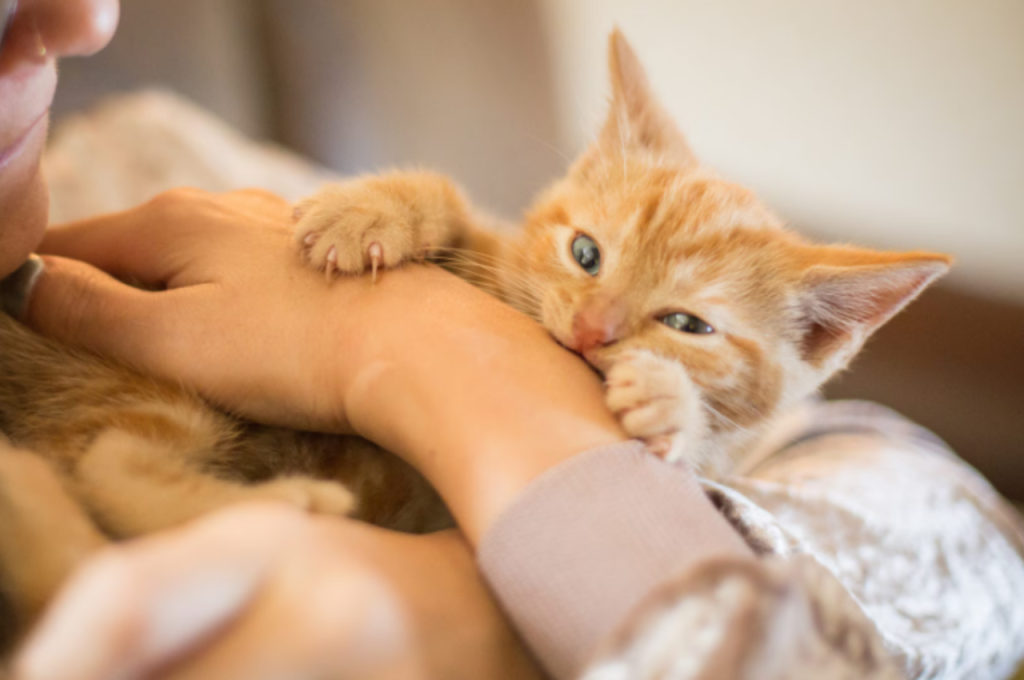When your cat nibbles you, it could be a sign of affection or playfulness. It’s a common behavior among cats and shouldn’t be a cause for concern unless it becomes aggressive.
Cats are known for their quirky behaviors, and nibbling is just one of them. It’s their way of showing affection or playfulness, similar to how they would nibble on their toys or prey. However, sometimes nibbling can turn into biting or scratching, which could be a sign of aggression or over-stimulation.
As a cat owner, it’s essential to understand the difference between playful nibbling and aggressive behavior and to provide your cat with proper stimulation and playtime to prevent any unwanted behavior. In this blog post, we’ll explore the reasons why cats nibble and what you can do to discourage aggressive nibbling.
Decoding Feline Behavior
Discover the secrets behind your feline friend’s behavior. Learn why your cat nibbles you and the possible reasons behind this common behavior. Gain insights into decoding your cat’s actions and strengthening your bond.

Cats as Mysterious Creatures
Cats are known for their mysterious nature, often leaving owners puzzled by their behaviors. One common behavior that many cat owners may encounter is nibbling. This behavior can be confusing, but it is a way for cats to communicate.
Communication Through Actions
Cats use various actions to communicate with their owners, such as nibbling, purring, and rubbing against them.
- Nibbling is a way for cats to show affection or seek attention.
- It can also be a sign of playfulness or excitement.
- Understanding your cat’s body language can help decode their intentions.
The Nibble: a Sign of Affection?
Wondering why my cat nibbles me? The nibble is often a sign of affection. Cats nibble to show love, bond, and communicate with their owners. Gentle nibbles indicate trust and playfulness.
Affectionate Gestures in Cats
Cats have their own unique ways of showing affection, and one of these gestures is nibbling. When your cat nibbles you, it could be a sign of love and affection. Understanding the various ways cats express their fondness can help strengthen the bond between you and your feline friend.
Nibbling Vs. Biting
It’s important to differentiate between nibbling and biting when it comes to cat behavior. Nibbling is typically a gentle, almost playful gesture, whereas biting can be more aggressive or defensive. Paying attention to your cat’s body language and the context of the behavior can help you determine whether the nibble is a loving gesture or a sign of discomfort.
Understanding The Nibble
Cats often nibble as a form of communication, expressing affection, playfulness, or sometimes discomfort. Observing your cat’s behavior and body language can provide clues about their intentions.
Gentle Nibbles and Their Meanings
When your cat nibbles you gently, it’s a sign of affection and contentment. These soft nips are a way for your feline friend to show you love and trust. They may also be seeking attention or expressing happiness, much like a gentle human touch.
Context of Nibbling
Cats may nibble as a way of grooming or to get your attention. It’s important to pay attention to the context in which the nibbling occurs. If your cat nibbles during petting, it could be a sign of overstimulation or a request for a more gentle touch. If the nibbling is accompanied by purring and relaxed body language, it’s likely a positive behavior.
Social Bonding in Felines
When it comes to understanding the behavior of our feline friends, the act of nibbling can often leave cat owners puzzled. However, this seemingly odd behavior can actually be attributed to social bonding in felines.
Social Grooming Among Cats
Social grooming is an essential component of feline behavior, serving as a means for cats to strengthen their social bonds with one another. Through gentle nibbling and licking, cats engage in this grooming behavior to express affection and establish a sense of belonging within their social group.
Extending Grooming to Humans
When cats nibble on their human companions, it’s a way for them to extend the grooming behavior they use with other cats. This indicates that they view their human family members as part of their social group, seeking to reinforce the bond and convey a sense of trust and companionship.
Interpreting Cat Love Bites
These gentle nibbles are often a sign of affection or playful behavior. However, they can also indicate overstimulation or a request for attention. Observing your cat’s body language and understanding their preferences can help you respond appropriately and strengthen your bond.

Love Bites or Petting-induced Aggression?
When your cat nibbles you, it’s natural to wonder about the motive behind this behavior. Understanding whether it’s a sign of affection or aggression can help you better interpret your feline friend’s actions.
Recognizing The Signs of Affection
Cats often show their affection through gentle nibbling. It’s their way of expressing love and contentment, similar to how humans show affection through hugs or hand-holding. Recognizing these signs can help you foster a deeper bond with your cat.
The Science Behind Cat Bites
Understanding why does my cat nibble me involves exploring the science behind cat bites. Cats often nibble as a form of communication, expressing affection, playfulness, or even marking territory. Gentle nibbles can be a sign of bonding, while more aggressive bites might indicate overstimulation or a desire for space. Observing your cat’s body language and context can help decipher the reasons behind these nibbles and strengthen your bond.
Instinctive Behaviors in Domestic Cats
Cats are natural hunters and their instinctive behaviors are deeply rooted in their DNA. Nibbling is a form of communication and play that stems from their wild ancestors. When a cat nibbles you, it could be a sign of affection or simply a playful interaction. This behavior is a way for cats to establish social bonds and communicate with their human companions.
The Role of Scent Marking
Cats have scent glands in their teeth and when they nibble, they are also marking their territory with their scent. This behavior is a way for cats to assert their presence and ownership. It’s their way of saying, “You belong to me” and creating a sense of familiarity and security in their environment.
Training and Managing Nibbling
Discouraging Unwanted Nibbling
If your cat’s nibbling behavior becomes bothersome, there are several strategies you can employ to discourage it. First, ensure that your cat has plenty of appropriate chew toys and items to gnaw on. By redirecting their nibbling behavior to these items, you can help them understand what is acceptable to chew on.
Additionally, discourage nibbling by gently saying “no” and withdrawing attention when your cat nibbles on you. This will help them associate nibbling with a negative outcome and discourage the behavior over time. It’s also important to avoid physically punishing your cat for nibbling, as this can lead to fear or aggression. Instead, focus on positive reinforcement techniques to encourage more desirable behavior.
Positive Reinforcement Techniques
When your cat refrains from nibbling and interacts with you in a gentle manner, provide positive reinforcement through praise and rewards. This can include offering treats, extra playtime, or verbal affirmations. By rewarding the absence of nibbling, you can help your cat understand the behavior you expect from them.
Consistency is key when using positive reinforcement. By consistently rewarding non-nibbling behavior, you can effectively communicate to your cat what is expected and desired during interactions with you.
When Nibbles Are a Concern
It’s common for cats to nibble as a form of communication or affection. However, when it escalates to aggressive biting, it can be a cause for concern. Let’s delve into how to identify aggressive biting and potential health issues related to cat bites.

Identifying Aggressive Biting
- Sudden change in behavior
- Hissing or growling during the nibbling
- Ears flattened against the head
If your cat displays these signs, it may be exhibiting aggressive behavior that requires attention.
Health Issues Related to Cat Bites
- Risk of infection due to bacteria in a cat’s mouth
- Potential for deep puncture wounds
- Transmission of diseases such as cat scratch fever
Seek immediate medical attention if you experience redness, swelling, or pain after a cat bite.
Conclusion
Cats nibble their owners for various reasons, such as affection, play, or anxiety. Understanding the underlying cause can help owners mitigate the behavior and strengthen the bond with their feline companions. By providing appropriate toys, regular exercise, and positive reinforcement, owners can train their cats to communicate their needs without resorting to nibbling.
Remember, with patience and consistency, cats can learn to express themselves in more socially acceptable ways.
